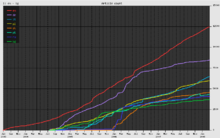Wikiquote
Parts of this article (those related to History) need to be updated. The reason given is: Last update for history is in 2018. (September 2023) |
 | |
Type of site | Quotation repository |
|---|---|
| Available in | Multilingual (74 active)[1] |
| Owner | Wikimedia Foundation |
| Created by | Daniel Alston, Brion Vibber and the Wikimedia community |
| URL | wikiquote |
| Commercial | No |
| Registration | Optional |
| Launched | 10 July 2003 |
| Current status | Active |
Wikiquote is part of a family of wiki-based projects run by the Wikimedia Foundation using MediaWiki software. The project's objective is to collaboratively produce a vast reference of quotations from prominent people, books, films, proverbs, etc. and writings about them. The website aims to be as accurate as possible regarding the provenance and sourcing of the quotations.
Initially, the project operated only in English from July 2003, expanding to include other languages in July 2004.[2] As of December 2024, there are active Wikiquote sites for 74 languages[1] comprising a total of 341,889 articles and 1,953 recently active editors.[3]
History
[edit]
The Wikiquote site originated in 2003.[4] The article creation milestones are taken from WikiStats.[2]
| Date | Event |
|---|---|
27 June 2003
|
Temporarily put on the Wolof language Wikipedia (wo.wikipedia.org). |
10 July 2003
|
Own subdomain created (quote.wikipedia.org). |
25 August 2003
|
Own domain created (wikiquote.org). |
17 July 2004
|
New languages added. |
13 November 2004
|
English edition reaches 2,000 pages. |
November 2004
|
Reaches 24 languages. |
March 2005
|
Reaches 10,000 pages in total. English edition has close to 3,000 pages. |
June 2005
|
Reaches 34 languages, including one classical (Latin) and one artificial (Esperanto) |
4 November 2005
|
English Wikiquote reaches 5,000 pages. |
April 2006
|
French Wikiquote taken down for legal reasons. |
4 December 2006
|
French Wikiquote restarted. |
7 May 2007
|
English Wikiquote reaches 10,000 pages. |
July 2007
|
Reaches 40 languages. |
February 2010
|
Reaches a total of 100,000 articles among all languages. |
May 2016
|
Reaches a total of 200,000 articles among all languages. |
January 2018
|
Introduced in the curriculum of national partnerships between schools and non-profits (Italy[5]) |
Operation
[edit]Wikiquote is one of few online quotation collections that provides the opportunity for visitors to contribute[6] and the very few which strive to provide exact sources for each quotation as well as corrections of misattributed quotations. Wikiquote pages are cross-linked to articles about the notable personalities on Wikipedia.[7]
Multi-lingual cooperation
[edit]As of December 2024, there are Wikiquote sites for 97 languages of which 74 are active and 23 are closed.[1] The active sites have 341,889 articles and the closed sites have 638 articles.[3] There are 4,301,482 registered users of which 1,953 are recently active.[3]
The top ten Wikiquote language projects by mainspace article count:[3]
| No. | Language | ISO | Good | Total | Edits | Admins | Users | Active users | Files |
|---|---|---|---|---|---|---|---|---|---|
| 1 | English | en | 55,235 | 216,107 | 3,618,400 | 16 | 3,206,971 | 554 | 0 |
| 2 | Italian | it | 52,078 | 201,070 | 1,357,150 | 10 | 101,024 | 199 | 265 |
| 3 | Polish | pl | 29,366 | 53,780 | 592,663 | 10 | 58,279 | 77 | 1 |
| 4 | Russian | ru | 17,089 | 43,827 | 421,823 | 5 | 107,339 | 74 | 0 |
| 5 | Czech | cs | 13,999 | 18,565 | 162,093 | 2 | 19,767 | 32 | 1 |
| 6 | Estonian | et | 13,429 | 22,542 | 129,505 | 3 | 4,936 | 17 | 2 |
| 7 | Portuguese | pt | 11,835 | 36,203 | 221,435 | 4 | 42,273 | 36 | 1 |
| 8 | Ukrainian | uk | 10,680 | 39,451 | 143,798 | 5 | 19,497 | 40 | 0 |
| 9 | Hebrew | he | 10,009 | 20,002 | 219,314 | 3 | 25,547 | 35 | 502 |
| 10 | French | fr | 9,529 | 35,597 | 405,073 | 6 | 77,894 | 115 | 0 |
For a complete list with totals see Wikimedia Statistics: [8]
Use in experiments
[edit]It can be possible to utilise Wikiquote as a text corpus for language experiments.[9] The University of Wroclaw team entering Conversational Intelligence Challenge of the 2017 Conference on Neural Information Processing Systems (NIPS 2017) used Wikiquote to produce a conversational talker module for extraction of rare words.[10] Researchers have used Wikiquote to train language models to detect extremist quotes.[11]
Reception
[edit]Wikiquote has been suggested as "a great starting point for a quotation search" with only quotes with sourced citations being available. It is also noted as a source from frequent misquotes and their possible origins.[12][13] It can be used for analysis to produce claims such as "Albert Einstein is probably the most quoted figure of our time".[14][non-primary source needed]
See also
[edit]References
[edit]- ^ a b c Wikimedia's MediaWiki API:Sitematrix. Retrieved December 2024 from Data:Wikipedia statistics/meta.tab
- ^ a b "Wikiquote Statistics - Article count (official)". Wikimedia. Archived from the original on 29 January 2018. Retrieved 28 January 2018.
- ^ a b c d Wikimedia's MediaWiki API:Siteinfo. Retrieved December 2024 from Data:Wikipedia statistics/data.tab
- ^ Woods, Dan; Theony, Peter (February 2011). "3: The Thousand Problem-Solving Faces of Wikis". Wikis for Dummies. John Wiley & Sons. p. 58. ISBN 978-1-118-05066-8. OCLC 897595141. OL 5741003W.
- ^ "Protocollo MIUR-Wikimedia" (in Italian). Ministero dell'istruzione, dell'università e della ricerca. 26 January 2018. Archived from the original on 28 January 2018. Retrieved 28 January 2018.
- ^ DeVinney, Gemma (18 January 2007). "Wikiquote: Another source for quotes on the Web". UB Reporter. University of Buffalo. Archived from the original on 16 July 2012. Retrieved 29 November 2010.
- ^ Ahsan, Hafsa (27 January 2007). "It's all about Wikis". DAWN. Archived from the original on 4 May 2012.
- ^ "Wikiquote Statistics". Meta.Wikimedia.org. Archived from the original on 1 July 2012. Retrieved 11 September 2020.
- ^ Buscaldi, D.; Rosso, P. (2007). Masulli F.; Mitra S.; Pasi G. (eds.). Some Experiments in Humour Recognition Using the Italian Wikiquote Collection. International Workshop on Fuzzy Logic and Applications. Lecture Notes in Computer Science. doi:10.1007/978-3-540-73400-0_58. ISBN 978-3-540-73399-7.
- ^ Chorowski, Jan; Łancucki, Adrian; Malik, Szymon; Pawlikowski, Maciej; Rychlikowski, Paweł; Zykowski, Paweł (21 May 2018). A Talker Ensemble: the University of Wrocław's Entry to the NIPS 2017 Conversational Intelligence Challenge (Report). arXiv:1805.08032v1.
- ^ Lane, R.O.; Holmes, W.J.; Taylor, C.J.; State-Davey, H.M.; Wragge, A.J. (30 March 2021). Predicting the Descent into Extremism and Terrorism (PDF). 6th IMA Conference on Mathematics in Defence and Security. Institute of Mathematics and its Applications.
- ^ Rickson, Sharon (22 November 2013). "How to Research a Quotation". New York Public Library. On the Web. Archived from the original on 18 October 2018. Retrieved 10 December 2019.
- ^ Rentoul, John (11 May 2013). "The top ten:Misquotations". The Independent. Independent Digital News & Media Ltd. Archived from the original on 11 December 2019. Retrieved 13 December 2019.
- ^ Robinson, Andrew (4 December 2019). "5 things you (probably) didn't know about Albert Einstein". History extra - BBC. Albert Einstein is probably the most quoted figure of our time. Archived from the original on 5 December 2019. Retrieved 12 December 2019.

